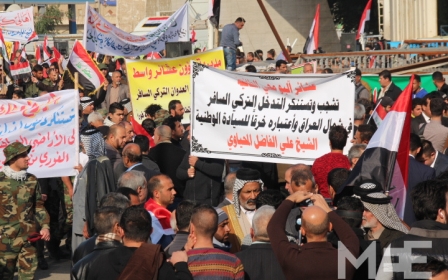Nineveh council rejects Shia militias participation in Mosul battle

Local politicians in the northern Iraqi province of Nineveh have rejected any participation of Shia militias in any future campaigns to liberate the Islamic State stronghold of Mosul.
Nuraddin Qablan, the chief deputy of the Nineveh Provincial Council, said that the involvement of the powerful Popular Mobilisation Units (PMUs) in liberating Mosul - which is the capital of Ninevah province - would exacerbate sectarian tensions and draw locals to IS.
"The provincial council voted on a resolution to ban the PMU from participating in the battle of liberation of Mosul," said Qabalan, according to the independent Iraqi paper Akhbaar.
“The council's decision aims to deny IS the opportunity to exploit the PMUs' participation in order to recruit the people of Nineveh in its ranks."
The Sunni majority governorate of Nineveh largely fell to IS in 2014 following a rapid takeover of the city of Mosul by the group in the face of an under-equipped and largely incompetent Iraqi army.
Though many in the province have been deeply critical of IS, many also saw them as a preferable alternative to the government of former prime minister Nouri al-Maliki who had long been accused of discrimination against the country’s Sunni minority and of indiscriminately attacking civilian areas.
Nineveh also had one of the longest surviving Christian populations, much of which fled following the 2003 fall of Saddam Hussein and the rise of Islamic militant groups.
Despite attempts by Iraqi Prime Minister Haider al-Abadi to route out the sectarianism of his predecessor, the rise to power of the PMUs - following a call to arms by Shia religious leader Ali al-Sistani in June 2014 - has meant that Abadi has often relied upon them for the defence of the nation.
On Saturday, Abadi said that the PMUs (using the Arabic name Hashd al-Shaabi) would be participating in the liberation of Mosul.
“There is no pressure from the US over the participation of Hashd al-Shaabi forces in Mosul's liberation, but they will participate,” he told the Parliament.
He added that, in spite of concerns about foreign Shia militants, there would be “no foreign troops on the ground fighting Daesh except advisors training the Iraqi security forces”.
The US has expressed concern about the potential problems in reunifying Iraq if the PMUs lead the liberating forces against IS, particularly in light of numerous allegations of human rights abuses.
These concerns are thought to have led Abadi to keep the PMUs out of the battle to retake the city of Ramadi in Anbar province in late December and early January.
The push to retake Mosul remains the major obstacle in the fight against IS in Iraq.
The US has said it will step up its efforts to help Iraqi forces retake the city, though there has been no set timeframe for the operation.
US Defence Secretary Ash Carter said on Monday that US forces would have an enlarged role in the push against Mosul.
“We expect it to be like Ramadi in the sense that the Iraqi security forces under the control of the government of Iraq, Prime Minister Abadi, will be in the lead, but we will be enabling them," he said.
“And will we do more to enable them as they go north? Yes, we fully expect to do that.”
Stay informed with MEE's newsletters
Sign up to get the latest alerts, insights and analysis, starting with Turkey Unpacked
Middle East Eye delivers independent and unrivalled coverage and analysis of the Middle East, North Africa and beyond. To learn more about republishing this content and the associated fees, please fill out this form. More about MEE can be found here.




